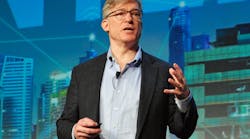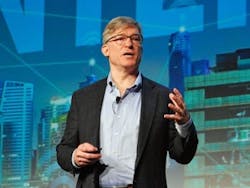“There’s a wide field of technology to be harnessed—by Rockwell Automation and our partners.” Rockwell Automation CEO Blake More announced a significant new strategic partnership with PTC at this week’s TechED conference in San Diego.
The first day of this year’s Rockwell Automation TechED came at “a very special moment for Rockwell Automation,” said Blake Moret, chairman & CEO, Rockwell Automation, to attendees of his opening keynote presentation this week in San Diego.
But attendees of the sold-out conference wouldn’t discover what made that moment so special until some 30 minutes later, when Moret welcomed Jim Heppelmann, CEO of PTC, to the stage to announce a significant new partnership and $1 billion equity investment by Rockwell Automation in the technology platform and solutions provider that, broadly speaking, “helps companies to design, manufacture, operate and service things for a smart, connected world.”
First, however, Moret updated the 2,300 some TechED attendees from 40 companies around the world on the global trends in industry and society that are driving the Rockwell Automation organization forward. “Our entire strategy is about bringing The Connected Enterprise to life—bringing information together to make people more productive, more efficient,” Moret said. The growth of the middle class across the world is causing more demand for food, clean water, pharmaceuticals, automobiles and more. “All those are important to us, helping companies to produce faster, with higher quality, at lower cost,” he said.
Meanwhile, the skills gap is growing. New talent is in short supply, and experienced people are retiring. “This is becoming a limiting factor for growth,” Moret said. So, more production must be done in more locations, he said. “Growing the supply chains around the world is essential, which means growing demand for connectivity across systems.”
IT/OT convergence
As producers move toward mass customization—production at scale, but increasingly personalized—we need to reduce setup times. “This is becoming second only to downtime for potential to improve ROI,” Moret said. “We need to optimize workflows—the human element. Technology is useless unless people are comfortable with it and can interact with it in a useful way.”
The convergence of business systems information technology (IT) and production operations technology (OT) “will drive another order of magnitude in productivity” in industries from oil & gas to automotive, Moret said. Convergence must be scalable, where we keep the plant-floor loops closed on the floor, and use the edge and cloud appropriately, he said. “So, we need people who understand the process to guide the integration.” He also announced the launch of a new Connected Enterprise consulting organization within Rockwell Automation to help guide the company’s clients in these sorts of efforts.
Rockwell Automation sees three factors as key to success, he added: understanding the process; expertise and innovation to make new and improved business models; and simplification—a single business, on a single platform. “These are what drive us at Rockwell Automation,” said Moret, “We’re doing it at devices, on lines, and throughout enterprises.”
Factory of the future
Moret critiqued his performance at a recent presentation to graduates at Georgia Tech, based on a 1987 paper he wrote on “The Factory of the Future,” asking, “What did I get right?”
He predicted the proliferation of controllers, CNC and robots reducing physical labor and contributing to productivity rising 120% over the past 30 years. But Moret didn’t foresee the rise of IT and mobility, the increasing importance of safety, and above all, the pace of change. “We saw Moore's Law in hardware, but not the revolution in business models through technology and its impact on the workforce—on jobs,” he said.
Today, “Companies must continue to innovate to compete around the world,” Moret said. “Worker knowledge must be blended with technology. Doing the same things in the same way won’t work.”
Fewer workers means industry needs more flexible workers who are cross-trained in a variety of disciplines. Fresh talent is also part of the solution, Moret said, acknowledging the importance of programs such as FIRST Robotics in grooming next-generation manufacturing workers. “We also welcome returning veterans—they have skills and can quickly learn the technology,” Moret said. “Our Academy of Advanced Manufacturing is graduating 150 of them this year, and is on track for a capacity of 1,000 per year. Nothing I have done in my career has made me more proud than our ability to stand up this organization.”
More than technology
Converging IT and OT is not just technology, it’s also buying practices. “Subscriptions, products as a service, software as a service—a significant portion of our sales are now in subscriptions and, essentially, leases,” Moret said.
Today, differentiation is not only a matter of scale, “not just being big so you can buy copper for less, but being flexible, doing customization and partnering effectively,” Moret said. “There’s a wide field of technology to be harnessed, including artificial intelligence, augmented reality, edge and cloud—by Rockwell Automation and our partners.”
Moret then called PTC’s Heppelmann to the stage, and together they announced a new strategic alliance that is expected to accelerate growth for both companies and enable them to be the partner of choice for customers around the world who want to transform their physical operations with digital technology.
PTC and Rockwell Automation have agreed to align their respective smart factory technologies and combine PTC’s award-winning ThingWorx IoT, Kepware industrial connectivity, and Vuforia augmented reality platforms with the best-in-class FactoryTalk MES, FactoryTalk Analytics, and Integrated Architecture control systems from Rockwell Automation.
The result, agreed Moret and Heppelmann, will be an unmatched integrated information solution that will enable customers to achieve increased productivity, heightened plant efficiency, reduced operational risk, and better system interoperability.
As part of the partnership, along with Rockwell Automation's $1 billion equity investment, Moret will join PTC’s board of directors.
“This strategic alliance will provide the industry with the broadest integrated suite of best-in-class technology,” added Heppelmann. “Leveraging Rockwell Automation’s industry-leading industrial control and software technology, strong brand, and domain expertise with PTC’s award-winning technology enables industrial enterprises to capitalize on the promise of the Industrial IoT.”






